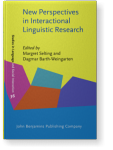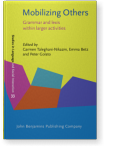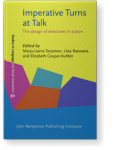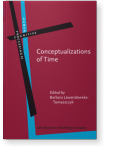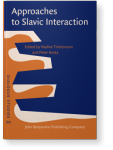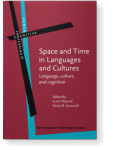Jörg Zinken
List of John Benjamins publications for which Jörg Zinken plays a role.
2024 Introducing the “Parallel European Corpus of Informal Interaction” (PECII): A novel resource for exploring cross-situational and cross-linguistic variability in social interaction New Perspectives in Interactional Linguistic Research, Selting, Margret and Dagmar Barth-Weingarten (eds.), pp. 132–160 | Chapter
This article introduces the Parallel European Corpus of Informal Interaction (PECII), a multi-language video-corpus of social interactions in a range of informal settings and activity-contexts. After describing the basic motivation for its compilation, the design principles that underlie its… read more
2020 Chapter 10. Doing more than expected: Thanking recognizes another’s agency in providing assistance Mobilizing Others: Grammar and lexis within larger activities, Taleghani-Nikazm, Carmen, Emma Betz and Peter Golato (eds.), pp. 253–278 | Chapter
In informal interaction, speakers rarely thank a person who has complied with a request. Examining data from British English, German, Italian, Polish, and Telugu, we ask when speakers do thank after compliance. The results show that thanking treats the other’s assistance as going beyond what could… read more
2017 Chapter 2. A cline of visible commitment in the situated design of imperative turns: Evidence from German and Polish Imperative Turns at Talk: The design of directives in action, Sorjonen, Marja-Leena, Liisa Raevaara and Elizabeth Couper-Kuhlen (eds.), pp. 27–63 | Chapter
In the management of cooperation, the fit of a requested action with what the addressee is presently doing is a pervasively relevant consideration. We present evidence that imperative turns are adapted to, and reflexively create, contexts in which the other person is committed to the course of… read more
2016 When time is not space: The social and linguistic construction of time intervals and temporal event relations in an Amazonian culture Conceptualizations of Time, Lewandowska-Tomaszczyk, Barbara (ed.), pp. 151–186 | Article
It is widely assumed that there is a natural, prelinguistic conceptual domain
of time whose linguistic organization is universally structured via metaphoric
mapping from the lexicon and grammar of space and motion. We challenge
this assumption on the basis of our research on the Amondawa (Tupi… read more
2013 Reanimating responsibility: The weź-V2 (take-V2) double imperative in Polish interaction Approaches to Slavic Interaction, Thielemann, Nadine and Peter Kosta (eds.), pp. 35–61 | Article
This study analyses the use of the Polish weź-V2 (take-V2) double imperative to
request here-and-now actions. The analysis is based on a collection of approximately 40 take-V2 double
imperatives, which was built from a corpus of 10 hours of video recordings of everyday interactions
(preparing… read more
2012 1. Event-based time intervals in an Amazonian culture Space and Time in Languages and Cultures: Language, culture, and cognition, Filipović, Luna and Katarzyna M. Jaszczolt (eds.), pp. 15–35 | Article
We report an ethnographic and field-experiment-based study of time intervals in Amondawa, a Tupi language and culture of Amazonia. We analyse two Amondawa time interval systems based on natural environmental events (seasons and days), as well as the Amondawa system for categorising lifespan time… read more
